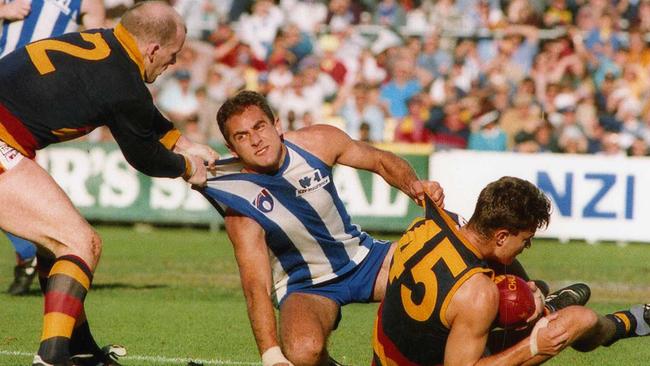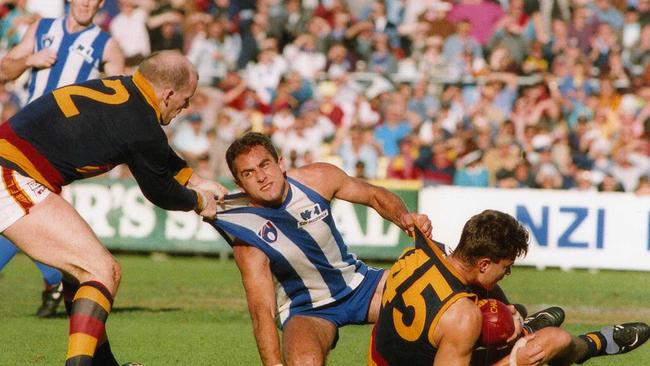Q&A recap: Anxiety, depression, stigma, self-stigma, indigenous suicide rates and medication
HE achieved all of his wildest dreams on the football field, but AFL great Wayne Schwass secretly felt like he was living a shameful lie.

News
Don't miss out on the headlines from News . Followed categories will be added to My News.
“THE community in this great country of ours needs to stop labelling mental illness, because it is not fair, not right, and I will continue to push that envelope as much as I can.”
That was the message from former AFL great Wayne Schwass, who opened up about his long battle with mental illness on Q&A last night.
The former North Melbourne and Sydney Swans player, who set up the Sunrise Foundation to help young people with depression, told the audience that he pretended for years to be OK, when in reality he was struggling.
Schwass’ comments came after the first question of the night from Sydney schoolboy Xavier Eales, whose speech about his own personal battle with depression at a recent school assembly went viral.
“In my experience, the whole experience of mental illness is to destroy your self-worth,” Schwass told the audience.
“It is interesting that you can be successful in your chosen profession and yet you see no positive benefit of what you are doing and I lived through that for a long period of my life.
“I was diagnosed in 1993, vice-captain to Wayne Carey who I regarded as the greatest player ever to have played the game. I achieved everything I wanted to achieve after my sporting career, but after 11 years of diagnosis, I grew tired of pretending.
“Like Xavier said, every single waking moment of my life was pretending to everybody else, family, friends, pretending I was OK and I was not, I was miserable, very unwell and unhealthy.
“It got to the stage of being diagnosed in 1993, in October 1995, I made the decision to sit down with my family - that’s 12 years after diagnosis - and I put it on the table and it was the beginning of the slow process of getting my life back.”

Schwass said he decided to go public not only to help break down the stigma surrounding mental illness, but also as part of his therapy.
“In March of 2006 I went public and I went public for two very good reasons or reasons that I felt were good. One, sport has given me a great vehicle to use the popularity of sport to advocate for better social inclusion around mental illness and that’s something I’m incredibly passionate about, but the second reason was I did not want anybody to not know my story.
“If people judge me negatively that was OK, but it was the first time I could be authentic and that was the beginning of a slow process of recovery; of getting well. My illness doesn’t define me.
“It has been a big process of how I am today. I have people who support me in my life and if people want to make a judgment or have a different negative decision on me, that’s OK, that’s their opinion.
“In regards to self-stigma, I think it is judgment ridicule or ostracisation because of an illness. Breast cancer, bowel cancer, prostate cancer, diabetes, asthma, we don’t do that.
“I can only talk about myself: we assume, we ruminate, we worry, live in constant fear of what people will think.
“If there is anybody in the room tonight that thinks that way, please don’t do that to yourself. “There is an unbelievable amount of support both on this panel tonight, but right throughout the broader Australian community, that can help you. It is your life, you deserve to get the best available treatment without fear or favour.”
.@WayneSchwass discusses overcoming stigma and whether it was worth it to speak out #QandA http://t.co/Ot7SpHqmgO
— ABC Q&A (@QandA) October 5, 2015Schwass, who stopped using medication five years ago, also revealed that he used to hide his pills because he was ashamed.
“I would hide my medication, I was ashamed I didn’t want my partner, now my wife, mother to my three children know I was on medication, because I saw my medication as a weakness,” he said.
“A couple of things I found were incredibly beneficial for my health and recovery. One, I owned my illness, I stopped denying it, accepted it and then started to bring those closest to me into the conversation so I didn’t have to pretend. That was number one. Number two, I didn’t hide my medication from my partner. I took it openly and that was really important in the process.”
Throughout the one-hour program, panellists discussed the rate of mental health issues in the wider community and the extremely high rate of suicides in indigenous communities.
Professor Pat Dudgeon from the Australian indigenous Psychologist’s Association told the program suicide rates in Aboriginal communities was twice that of the wider population.
“One thing we do have is good measurements of our mental health, but there is a mental health gap for Aboriginal and Torres Strait Islander people,” she said.
“We have incredibly high rates of suicide, twice that of the other population, we have high rates of psychological distress, high rates of depression, high rates of self-harm and they are increasing, and it is a big concern.”
And while the topic of the discussion was quite serious, NSW deputy mental health commissioner Fay Jackson, who has bipolar disorder, managed to lighten the mood by recounting to the audience the moment she was diagnosed and how she handled dealing with the stigma.
“I actually passed out, it was such a huge shock to me, because I thought I had been chosen by God, that I was special by being chosen by God, and then you’re told, “No, no, you’re just insane,” she joked.
“So it was a bit of a shock.”
If you need help contact Lifeline on 13 11 14 or beyondblue on 1300 22 4636



